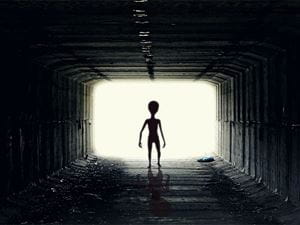
Alien life has been a source of fascination for decades. No science fiction movie is complete without an obligatory appearance by some form of alien life, and few things have captured the popular imagination more than tales of alien abductions and the crop circles left, supposedly, by interstellar visitors to Earth.
A fascination with aliens is not limited to fans of the science fiction genre. Real life scientists have dedicated their lives to learning whether or not humanity is alone in the universe. A serious hunt for extraterrestrial life began shortly after the radio was invented, and in 1974, the famous Arecibo message was fired out into space containing basic information about life on Earth including Earth’s position in the solar system and an image of human DNA. Over time, the scientific search for intelligent alien life came to be known as SETI, the Search for Extraterrestrial Intelligence. Far from a fringe project, the program has been funded by NASA and involves the assistance of numerous respected observatories and a variety of university research centers across multiple countries.
As telescopes become more powerful and instrumentation becomes more sensitive, space observatories and programs have been able to detect smaller planets at greater distances than ever before. As the number of these Earth-like objects increase, so does the statistical likelihood that humanity will find alien life. NASA has already identified over two dozen planets that, like Earth, are rocky and believed to be in the “habitable” or “goldilocks” zone that meet the conditions scientists believe are required to sustain life. At the very least, those planets appear to fall within the parameters that life on Earth requires to flourish. Alien life, of course, could be mind-blowingly different. Liquid water has long been thought of as the key to life, but there is always the possibility that extraterrestrial life evolved to survive on water vapor as opposed to liquid. Seeking Earth-like conditions, however, gives exoplanet hunters a place to start their search.
What happens if humanity finds alien life? Obviously, the first two concerns are whether or not said extraterrestrials are intelligent, and if they are, are they friendly? Humanity has enough problems at home without dealing with enemies from another planet. Assuming that the alien lifeforms are friendly or at least not malevolent, any number of things could happen next depending on both their level of technology and how advanced Earthly space travel and communication has become by then. Many of the possible outcomes of contact with alien life have been explored by science fiction. What few people seem to think about, however, is the potential consequences of alien life on Earthly belief systems. What would extraterrestrial life mean to Christianity? Can Christians believe that humans are not alone, or would that compromise their faith?
Belief in aliens is no longer a fringe conspiracy theory thanks to the work of SETI. As such, it is something that Christians have to grapple with in their lives. It may not be as urgent as other questions of faith, but it is worth considering.
There is nothing wrong with believing that humanity is not alone in the universe. The Bible, after all, makes it clear that God created everything in the universe. That would include any form of alien life, and the Bible never explicitly says that humans are the lone lifeforms in the universe. That said, belief in aliens does raise a number of questions for Christians. The first and largest, of course, is how aliens fit into Christians ideas about salvation. Did Jesus’ death save every living being, or did it only affect humanity? If it was the latter, does that mean that human Christians have a duty to evangelize aliens, or did God incarnate repeatedly across various inhabited worlds in order to save all of His creations? The belief systems of the extraterrestrials might be able to answer that question. After all, their religion may turn out to closely mirror Christianity.
Another potential issue brought up by the existence of aliens would be what that means for humanity’s position in God’s eyes. The Bible is normally interpreted as placing humanity on a pedestal. The existence of aliens would bring a new and dangerous dimension to that interpretation. Continuing to hold that Homo sapiens are the pinnacle of God’s plan would mean that humans are inherently more important and worthy than a species that may be equally intelligent and sentient. This would give rise to a terrible sort of speciesism. Many people, however, would find it inconsistent with the Bible to say that humanity did not have a special place in God’s heart. That said, the existence of alien life might suggest that it was not so much Homo sapiens who were placed at the pinnacle of creation as much as intelligent life being elevated above animals and plants. This would enable humans to retain the sense of being made in the image of God without creating a new form of racism. Ted Peters, Professor Emeritus in Theology at Pacific Lutheran Theological Seminary, pointed out that the “special” is not used only to refer to unique phenomena. The discovery of alien life would not necessarily compromise God’s love for humanity “just as a parent’s love for a child is not compromised because that child has a brother or sister.”
All of the debate over alien life, of course, is a moot point if it is never discovered.
The debate also changes dramatically if the life discovered is not intelligent. Extraterrestrial animals or plants, after all, do not pose much of a threat to Earthly religious ideas. A sentient, sophisticated race of extraterrestrial life, on the other hand, would force every person on Earth to change how they think about everything. That said, the aliens would likely be just as confounded by the existence of humanity as humans were by them. With the classification of “intelligent life” abruptly doubling in size, there would be something comforting in knowing that, just as humans were not alone in the universe, they were not alone in being baffled and overwhelmed by the inevitable next question. “We are no longer alone. Now what?”
